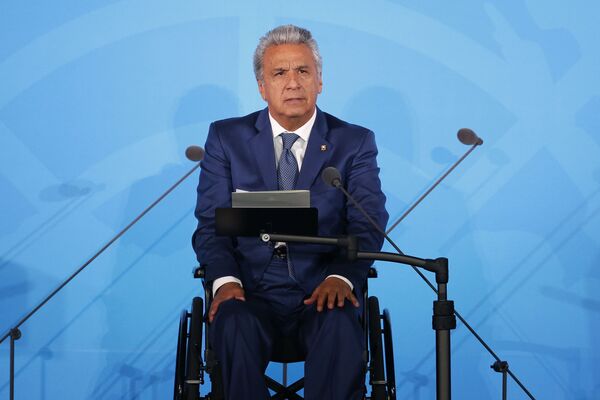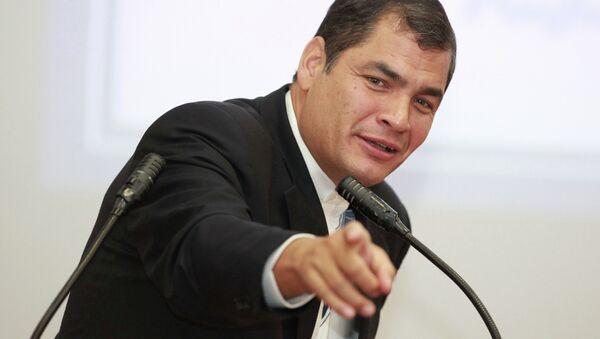On 7 April, former Ecuadorian President Rafael Correa was sentenced in absentia to eight years in prison for alleged corruption during his 10-year tenure as head of state.
Along with 19 other defendants, Correa was found guilty by the Ecuadorian authorities of accepting what the court called "bribes" from private firms in exchange for state contracts. The sentence also bars those convicted from engaging in politics for the next 25 years.
However, according to Correa, who is currently living in exile in Belgium, the sentence is nothing but a political persecution campaign kicked off by his successor and former ally, Lenín Moreno, to keep him out of Ecuadorian politics.
"They were desperate to sentence me before 2021 to try to hinder my participation [in the election]", Correa says, referring to next year's presidential vote in the country.
The former Ecuadorian president denies receiving bribes from companies and any wrongdoing. According to him, "the executive power violated the constitution and replaced 60 percent of judges".
"The contracts the prosecution refers to do not exist, this is a farce cooked up by the judicial system", he underscores.

'Criminal' Handling of COVID-19
At the same time, Correa regrets that he was ousted from the political arena, calling the Ecuadorian government's handling of the coronavirus crisis as "criminal".
"The government is irresponsible and criminal", he says. "It's not me saying this, all indicators speak for themselves: our country has the highest mortality from coronavirus in Latin America".
According to the World Health Organisation (WHO), Ecuador accounts for 7,529 confirmed cases and 355 deaths, as of 14 April. For its part, Johns Hopkins cites 7,603 cases and 369 coronavirus-related deaths in the country.
The former head of state bemoans the fact that the Moreno government "threw out health officials, ended the agreement with Cuban doctors and reduced the health budget".
Just before the pandemic, in mid-November 2019, Quito terminated health accords with Cuba that dated back to 2013 and pulled about 400 Cuban medical professionals out of the country.
Correa recalls that Ecuador was one of the countries that best coped with the outbreak of the swine flu in 2009.
"Now we are one of the worst examples in the world", he remarks.
"The coronavirus took the country's healthcare system off guard", the politician says. "In January, the emergency response protocols for fighting the pandemic were already known. But they did nothing. They didn’t equip hospitals, they didn’t hire doctors, they didn’t acquire respirators".
He notes that his hometown, Guayaquil, is now suffering not only because of the virus, but also because of the national government's inability to curb the pandemic.
"Next week, Guayaquil will collect even more dead", Correa says. "This disaster is just the beginning. Necessary measures have not been taken. I don’t see the light at the end of the tunnel".
However, "even in this nightmare crisis, [the government] is obsessed with political persecution", he notes. "It is very painful, and at the same time, outrageous".
'Pandemic is Destroying Neoliberal Paradigm'
To make matters worse, the country is bracing for a drastic economic crisis, warns the former head of state, stressing that the economy of Ecuador is undermined by the government's neoliberalism.
"The pandemic has shown us that health cannot be a commodity, it is everyone’s right, and it is necessary to guarantee everyone the access to this right", Correa highlights. “[The pandemic] has shown us the importance of collective actions which are taken in the modern world by states, that is, showed us the importance of the state".
According to the former Ecuadorian president, the COVID-19 outbreak is destroying the neoliberal paradigm.
"The world will change after this pandemic", he predicts.
At the same time, he criticises the lack of regional coordination in responding to the health crisis, which has resulted in the growing role of the military. “Peru sent tanks to the border with Ecuador so that infected people could not cross the border. They want to fight the virus with tanks. Are we crazy? There is no coordination either regionally or globally", he says.
"In the 21st century, it is necessary to reconsider the role of the armed forces in Latin America, which decide what is good and what is bad together with the media, who call themselves defenders of democracy – when, in fact, they stole it from us – and defenders of freedom of speech, while they destroy it by not informing but manipulating information. There will be no real democracy in Latin America until the issue of the media and the armed forces is resolved", Rafael Correa concludes.


